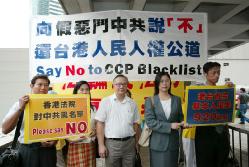(Clearwisdom.net) According to Radio Free Asia's report on September 20, 2005, eighty Falun Gong practitioners, including a ten-year-old child, planned to go to Hong Kong to attend a Falun Gong event in 2003. However, at the Hong Kong airport, Hong Kong authorities barred them from entering the city with the excuse that they were "security risks." They have applied for a judicial review of the case and the high court started the hearing on Tuesday (September 20).
Falun Gong practitioners protest against the Hong Kong government's deportation, in which violence was used
Senior counsel Paul Harris who represents the eighty Taiwanese Falun Gong practitioners pointed out that Falun Gong is legal in Hong Kong and religious freedom is also ensured in the Basic Law. Article 141 of the Basic Law states, "Religious organizations and believers in the Hong Kong Special Administrative Region may maintain and develop their relations with religious organizations and believers elsewhere." The clients had valid visas prior to their trip to Hong Kong and they have no criminal records. The Falun Gong event that they were to take part in was peaceful.
Harris made a "discovery application" to obtain documents relating to the government's decision denying entry to the eighty Taiwanese Falun Gong practitioners to the territory, including a watch list used by the Internal Immigration Department.
The government counsel Daniel Fung Wah-kin SC opposed the application. Should the judge order the release of security information, Fung said, the relevant "ministers" would have to be informed to consider an application for "public interest immunity."
Justice Michael Hartmann originally planned to continue the hearing on Tuesday afternoon, but the court announced in the afternoon that the hearing was postponed to Wednesday morning, since Justice Hartmann did not feel well.
Four Falun Gong practitioners flew to Hong Kong to appear in court after they obtained special permission from the Hong Kong government. Before the court hearing began, more than thirty Hong Kong Falun Gong practitioners and the four Taiwanese practitioners marched from the Charter Garden to the court. During the hearing, Hong Kong practitioners staged a protest and practiced their exercises outside the court to support the court review.
One of the plaintiffs, Ms. Theresa Chu Woan-chyi, an in-house lawyer with a US insurance company, believes that this lawsuit will be a crucial test of the "one country, two systems." What is crucial is whether the Hong Kong government is demanded to reveal their "watch list." If plaintiffs' names appear on the watch list, it indicates the blacklist provided by China is the major reason why they were barred entry to Hong Kong.
She said that once the blacklist is revealed, we can clearly see that if our names show up on the list, it is definitely not because that we had committed any crimes. Because we have no criminal records in Taiwan or any other places in the world. We had been to Hong Kong before and we never carried any contraband or weapons. If the blacklist is revealed, one will clearly see that we are on the list due to our affiliation with Falun Gong.
Ms. Chu disclosed that from 2001 to 2004, more than 200 Taiwanese were identified as Falun Gong practitioners by the Hong Kong immigration department and consequently barred from entering the city. More than thirty Taiwanese people who have the same names as some Falun Gong practitioners were also barred entry in the name of "security risk," although they had valid Hong Kong visas. Ms. Chu condemned the Hong Kong government for not being reasonable. She said, "The more than 200 Taiwanese people including those thirty Taiwanese who are not Falun Gong practitioners but happened to have same the names as some practitioners were deported. This is really ridiculous."




